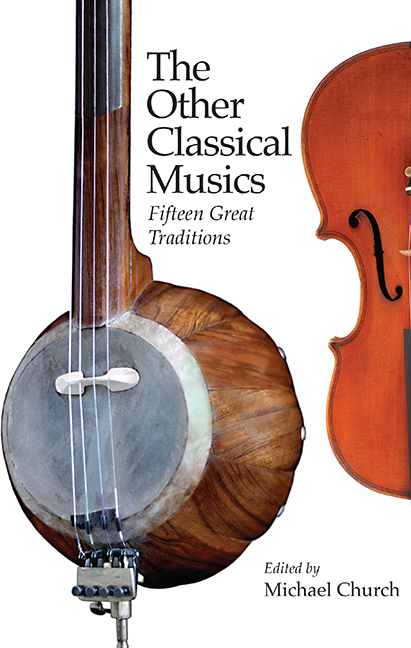Book contents
- Frontmatter
- Dedication
- Contents
- List of Illustrations
- List of Contributors
- Preface and Acknowledgements
- Introduction
- Maps
- 1 Thailand, Laos, Cambodia, Vietnam
- 2 Java
- 3 Japan
- 4 China: The Guqin Zither
- 5 Chinese Opera
- 6 North India
- 7 South India
- 8 Mande Jaliyaa
- 9 North American Jazz
- 10 Europe
- 11 North Africa and the Eastern Mediterranean: Andalusian Music
- 12 The Eastern Arab World
- 13 Turkey
- 14 Iran
- 15 Uzbekistan and Tajikistan
- Notes
- Bibliographies
- Index
3 - Japan
Published online by Cambridge University Press: 29 May 2021
- Frontmatter
- Dedication
- Contents
- List of Illustrations
- List of Contributors
- Preface and Acknowledgements
- Introduction
- Maps
- 1 Thailand, Laos, Cambodia, Vietnam
- 2 Java
- 3 Japan
- 4 China: The Guqin Zither
- 5 Chinese Opera
- 6 North India
- 7 South India
- 8 Mande Jaliyaa
- 9 North American Jazz
- 10 Europe
- 11 North Africa and the Eastern Mediterranean: Andalusian Music
- 12 The Eastern Arab World
- 13 Turkey
- 14 Iran
- 15 Uzbekistan and Tajikistan
- Notes
- Bibliographies
- Index
Summary
The accelerating rhythm of two hardwood clappers signals the opening of the curtain: an audience of several thousand watches as the immense stage is revealed. At its rear are eight singers, eight players of three-string, banjo-like instruments, five drummers and a flautist, all male and wearing matching kimono with broad-shouldered waistcoats and skirt-like trousers. A flute melody in free rhythm – a slow sliding stream of intervals, which may strike Western ears as otherworldly – accompanies the entrance of a samurai character, to enthusiastic yells from the audience. In stylised speech he introduces himself, and sets the scene. The lead singer launches into a slow chant-like song, accompanied by two hand-drums. Between drum-strokes, the drummers shout like martial arts competitors: yooo! ho! ya! ha!
Soon the banjos join in in unison, and the music becomes more rhythmic and melodic, the vocalists seeming to chase the string tune, a split-second behind the strongly-plucked beats. Actors enter along a runway passing through the audience, who shout further cries of encouragement. The flute re-enters, its melody seemingly unrelated to the voices and strings. At a dramatic climax the hero – a powerful warrior-priest – strikes an exaggerated pose, arms akimbo, eyes crossed. Accenting his pose, a deep-voiced stickdrum sounds from behind a screen offstage to the left, while – barely visible to the far right – a man in black pounds on a wooden board with two hardwood bars.
THIS is how a performance of a kabuki play might begin and develop. Sounds come at you from every direction: music from onstage and offstage musicians, heightened speech from the actors, shouts from the drummers and the audience, sound effects depicting insects or symbolising natural phenomena. Such a soundscape, however, would be unthinkable in the other genres of Japanese classical music covered in this chapter: each is specific to its social, physical and historical environment.
Ask a Japanese about classical music in Japan, and the names likely to pop up are those of Bach, Beethoven and Tchaikovsky. Or maybe the pianist Uchida Mitsuko, who studied in Vienna from the age of twelve and is now a British citizen. Or two recent figures of worldwide fame: composer Takemitsu Tōru and conductor Ozawa Seiji. But that's if you are conversing in English. In Japanese, you would have had to choose between two words for ‘classical’.
- Type
- Chapter
- Information
- The Other Classical MusicsFifteen Great Traditions, pp. 74 - 103Publisher: Boydell & BrewerPrint publication year: 2015



